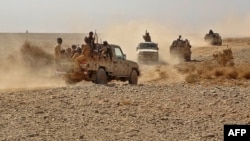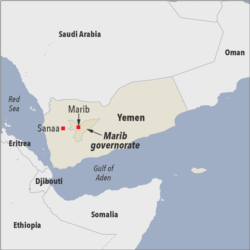The U.N. refugee agency is calling for greater security for civilians caught in a raging battle between Yemeni government forces and Houthi rebels for control of the northern governorate of Marib.
Marib, the governorate's capital, is the last major city still held by the Saudi-backed government in northern Yemen, which is largely under the control of Iranian-backed Houthi rebels. The city’s camps for the internally displaced are sheltering one-quarter of Yemen’s 4 million IDPs. Aid agencies believe they are in great danger.
In the first three months of this year, the U.N. refugee agency reports at least 70 incidents of armed violence have resulted in many deaths and injuries. UNHCR spokeswoman Aikaterini Kitidi says there were 40 civilian casualties in March alone, the highest number in one month since 2018.
“Airstrikes, shelling and crossfire have also badly damaged civilian infrastructure and property, including informal sites hosting the displaced, water tanks and shelters. Livestock has also been killed, depriving already impoverished communities of their livelihoods,” Kitidi said.
The UNHCR is renewing its call on all warring parties to take measures to protect civilians and civilian infrastructure. That includes sites hosting the displaced, which it says should not be turned into possible military targets.
Since the escalation of fighting, more than 13,600 residents in the region have been forced to flee their homes. Kitidi said the new displacement is putting a heavy strain on public services. As a consequence, she said families are forced to share their shelters with up to three other families.
“One in four families have no access to toilets, showers, or hand washing facilities near their shelters. With a second wave of COVID-19 hitting Yemen, and only half of the country’s health facilities functioning, the lack of sanitary services is making the situation more dire,” Kitidi said.
A recent UNHCR protection assessment found women and children represent almost 80% of the displaced population in Marib. It reports about a quarter of the children do not go to school. Most displaced families live on less than $1.40 a day.
The United Nations calls Yemen the world’s worst humanitarian crisis. The U.N. reports nearly one-quarter-million people have died since the country's civil war began more than six years ago. It notes nearly two-thirds of Yemen’s 24 million people need international assistance to survive.





